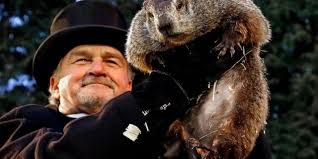In the 1993 film Groundhog Day, Punxsutawney Phil failed to see his shadow, whereby the stout mayor pronounced there would, sadly, be six more weeks of winter. In the darkness of February, Americans look for any glimpse of hope to stave off cold nights, dry skin and indoor confinement.
The Coronavirus’s indefinite outlook conjures up the same feelings of the blues and surrender. Covid-19 will indeed last for an indefinite period and we must brace for it as a nation. We erred, much like the marmot prognosticator occasionally does, by assuming that Covid-19 would only last “three months” on Feb. 26, 2020.
Phil the Groundhog

Because we are a foodservice consultancy, this piece will nonetheless revolve around the uncertainty of the U.S. restaurant industry as well as non-commercial and retail foodservice. The truth is, we have no idea how long or how severe the pandemic will be.
But what we do know, is that Americans hate uncertainty and are inclined to prepare for the worst. One can refer to FDR’s quote “the only thing to fear is fear itself,” to better understand the historical mindset of an American.
The Final Four: The Mindset of the U.S. Consumer and its Impact on Food Away-from-Home
| Group | Traits | Impact on Foodservice |
| The Fearful |
|
|
| Cautionaries |
|
|
| The Followers |
|
|
| The Ambivalent |
|
|
Source: Foodservice IP
We have developed four groups of consumers based on attitudes and behavior during the pandemic. Granted, we are not sociologists, but our work involves studying the consumer to better predict the peaks and valleys of the U.S. foodservice industry. The table describes The Fearful, Cautionaries, The Followers and The Ambivalent along with observed characteristics and their assumed impact on the vitality of foodservice (we encourage readers to estimate the percentage of the population that falls into each group along with the share each group impacts the health of foodservice.)
What we can do is educate
The foodservice sector has among the strictest standards of food handling, hygiene and food safety of nearly any industry. Salmonella, e-Coli or Norovirus are always lurking and operators must fend off the possibility of reputational damage – with or without the presence of Covid-19.
As industry leaders, ensure the public understands the actual risks of the Covid-19 virus and debunk any misinformation immediately using evidence-based information from reputable and trusted sources.

Recent Comments